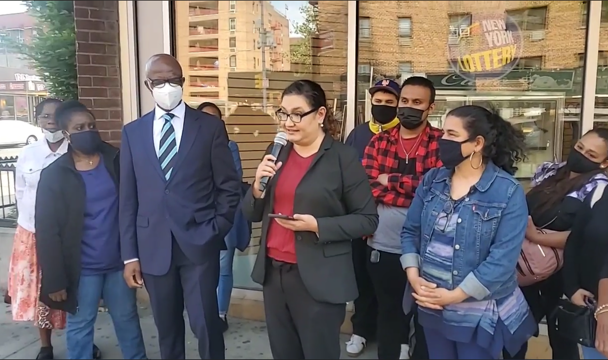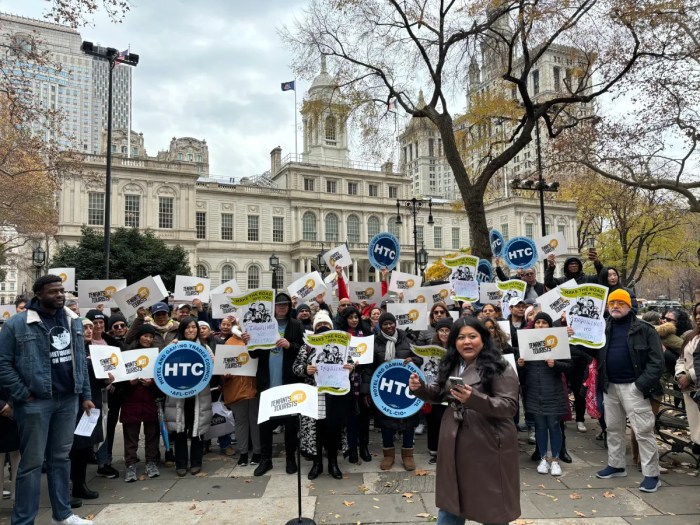A group of city council candidates gathered at LeFrak City recently to denounce a bill that would repeal ranked choice voting.
City Councilman I. Daneek Miller introduced the legislation, known as Intro 2326, on May 27, which was co-sponsored by fellow southeast Queens representative City Councilwoman Adrienne Adams, that would repeal sections of the New York City Charter establishing ranked choice voting (RCV), and would only go into effect if a majority of qualified electors voted in favor of its repeal during the November general election.
The new measure would not impact the June 22 primary.
“We introduced legislation as a security measure against the disappointing implementation of ranked choice voting,” Miller said. “Despite assurances that the Campaign Finance Board and the Board of Elections would conduct robust outreach and be ready for June, the opposite has been true. Outreach is still inherently flawed, with only $2 million being allocated to education until a month ago. The software for counting ranked choice ballots, approved just this week, has never been utilized at this magnitude and the state has expressed ongoing security concerns.”
The 2021 elections has been called the most consequential in recent city history with nearly all of the 51 City Council seats being contested along with the mayoral race, comptroller and four of the five borough presidents will be decided.
“Community and civic groups are crying out for assistance, and New Yorkers fear they will be disenfranchised,” Miller explained. “Should ranked choice voting go sideways in the primary election, Introduction 2326 would give a much larger percentage of voters an opportunity to make a truly informed decision, compared to the 10 percent of registered voters who voted in favor of overhauling our election system in the 2019 referendum.”
But a group of city council candidates said the new bill aims to end ranked choice voting in primary elections, a method approved by 73 percent of New York City voters in 2019.
Among them were District 21 candidates Ingrid Gomez and George Onuorah, District 26 candidates Brent O’Leary and Julie Won, as well as Evie Hantzopoulos of District 22 and Carolyn Tran of District 25.
“The bill to repeal ranked choice voting is not just undemocratic, it’s the definition of voter suppression,” Gomez said. “RCV was passed by an overwhelming majority of NYC voters, and I will not let the shadowy politicians who sponsored this bill to subvert the will of the people. All of us here as city council candidates will not stand for it, and that is why we call on all city electeds to vote no on Intro 2326.”
In February, the District 24 special election became the first in the city to be decided by ranked choice voting.
“It’s mind-boggling that anyone would conceive or machinate any idea of subverting the will of the people, no Democrat should go there, subverting the will of voters is unconscionable, inconceivable and unfathomable,” Onuorah said. “Dr. [Martin Luther King Jr.] and many like him fought courageously for our civil rights and voting rights and for anyone to mess with that right is atrocious and flies in the face of democratic values.”
Won noted that New Yorkers overwhelmingly voted in favor of ranked choice voting two years ago, hoping it would lead to more civil and issue-based political campaigns.
“For the City Council to consider repealing RCV so soon amounts to an abdication of their duty to carry out the will of their voters,” Won said. “To make our local elections fair, accessible, and more democratic, we must uphold ranked choice voting and fight for further electoral reform.”
Tran, who previously served as City Councilman Daniel Dromm’s chief of staff, also spoke against the measure.
“Instead of finding ways to disenfranchise the electorate, let us organize to educate our communities on RCV in language accessible ways, develop outreach plans with community leaders and organizations and partner with local and ethnic media,” Tran said. “We’re not going back to the status quo. Let’s empower the electorate and respect their choices.”



































